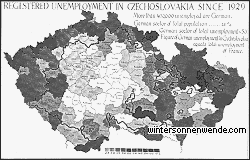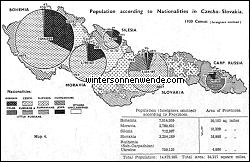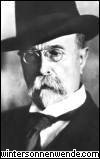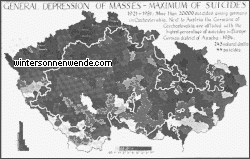 |
 George Henry Lane-Fox Pitt-Rivers The National Minorities and their Czech Masters The Czechs, originally a scattered Slav people settled primarily in the Imperial Austrian provinces of Bohemia, Moravia, and Silesia, owe their existence as a nation above all else to the ideology of President Wilson and his ecstatic affection for the birth of Bolshevik Russia, with which the Czechs have always been allied, secretly or openly, for the purpose of world revolution and the destruction of Germany and Austria. To the same inspiration the Czechs also owe their power to control and exploit the territory which once formed the richest part of the old Austro-Hungarian Empire. Although the territory of the Republic represents only 22 per cent of the former Austrian Empire, it contains by far the greater part of its industries. In addition to the greater part of the textile industries, the Czech Republic has taken over the industries in the old Empire according to the following proportions:
Cotton, wool, flax, jute, and silk industries vary from 75-95 per cent. Of the 282 coal mines formerly in the Austrian Empire, 219, or 79 per cent, were included in the Bohemian province of the new Czecho-Slovak Republic.15
Is it not strange, then, that, as we shall see, having seized all the richest and most prosperous districts within the old Austrian Empire, the Czechs have, in the course of twenty years, succeeded in reducing German Bohemia to a state of destitution and misery with the highest rate of unemployment in Europe? (See Map 3.) What then is Czecho-Slovakia? And who are the Czecho-Slovaks? The very name is a senseless absurdity and is intended to imply that there exists such a people called Czechoslovaks. "One might as well," wrote Lord Rothermere in the Daily Mail, 12th February, 1937, "talk of Anglo-Holland." No such people exists. Germans, Slovaks, Hungarians, Poles, and Ruthenians (Carpatho-Ukrainians) were forced into a Czech state, invented by an American professor, afterwards President of the United States, who was as ignorant of the elements of geography as he was of European politics, ethnology, or Bohemian history. Yet Czech propagandists and English journalists continue to talk about Czechoslovaks as though any such united national or racial people existed. Dr. Antonin Bohác, the Czech Official Statistician (Councillor of the State Bureau of Statistics, Prague), in giving the distribution of the native population by race, enumerates as separate racial groups: "Czechoslovaks," without distinguishing Czechs and Slovaks; Russians, including Ukrainians or Little Russian Ruthenians and Great Russians; Poles; German; Magyars; Jews - and "others". The English Press, similarly, continues to state (e.g. Sunday Pictorial, September 18th, 1938):
But the Czechs themselves, by their own figures, swelled by Jewish or other immigrants not racially discriminated, number only 7,406,493 (1930 Census) out of a total 14,729,536; at most, then, they can only claim to be 51.15 per cent of the total. While every other minority, and especially the Slovaks, have protested for years and have presented petitions to the League of Nations against being placed under Czech rule. The word 'Czech' is the native name for the Slavonic inhabitants of Bohemia and Moravia, and 'Czechy' is Slavonic for 'Bohemia'. This branch of the Slav family arrived, so far as is known, in Bohemia, then tenanted by Germanic tribes, about the 7th century A.D. The Slovak Council, under the hands of their President, Professor Francis Jehlicka, and their Chairman, Victor Dvorchak, in an "Appeal to British Common Sense for the Sake of World Peace" (June 1937) wrote:
"English fathers and mothers, do not allow your sons to sacrifice their lives for a bad cause like the Czecho-Bolshevik cause."16 In the name of common sense, then, let us once and for all understand that there are no such people as Czechoslovaks. From the beginning the Czechs have been used as the tools and the decoy of the Comintern and have been the protected allies of the Russian Soviet Dictatorship. It must also be remembered that it was not until the 1917 March revolution finally broke up the old Russian Empire in order to set up what soon became, and still aspires to be, a world Communist Dictatorship, that the financial interests of capitalistic America consented to join the Allies in the Great War. President Wilson, the friend of the late President Masaryk, and of ex-President Benesh, having borrowed the phrase "self-determination" from the Bolsheviks, was allowed to carve up Europe, which he hardly knew and which he never understood, in order to sow the seeds of endless future wars, cause endless persecution, terrorism, and tyranny because the votes of emigré Czechs were useful to him at home, in Pittsburg, Washington, and especially Chicago, where the Czechs were numerous and active. Even President Wilson's great admirer, Dr. H. A. L. Fisher, is constrained to admit: "Wilson did not represent his countrymen."17 Neither, we must insist, did he serve any other national interests except those of the Czechs and the internationalist dictators of Russia. This is how the minority nationalities and racial groups are divided amongst the population according to the 1930 Census:
N.B. - The Zionist and non-Orthodox Jewish population is far greater than the figure given for confessional Jews and is distributed amongst the figures which cover the other groups. No plebiscites of minority peoples in the new synthetic State of Czecho-Slovakia were allowed or considered necessary before half the total population in its five provinces were given over to its new and inexperienced democratic masters. By Article 84 of the Treaty of Versailles German nationals habitually resident in any of the territories defined as forming part of the Czecho-Slovakia State "will obtain Czecho-Slovakia nationality ipso facto and lose their German nationality." No other national minority was allowed to determine its own political or national allegiance. Teschen, the small but important mining area in Polish Silesia, was occupied and seized by the Czechs in January 1919, after deputies had been elected to represent Teschen in the new Polish constitutional parliament. When in 1920 Bolshevik troops under Tuckachewski were invading Poland and drawing nearer to Warsaw, before the Poles had had time to organise and equip an effective national army, the Hungarians offered to send two divisions to their assistance. The Hungarian and Polish Governments were agreed, but the Czech Government refused to allow the Hungarian troops passage through their territory; territory which, after all, had been Hungarian land. Similarly, they assisted the Bolsheviks by refusing to allow any munitions or supplies to reach Poland from Hungary. With this memory of Czecho-Bolshevik treachery and collaboration, the Polish and Hungarian Governments, not unnaturally, agreed in 1938 to demand a common frontier in Slovakia. The Czechs have always been the aggressors, not of the bold highwayman type, with a shouting challenge to "stand and deliver," but like the receiver of stolen goods and the sneak-thief, who picks the pockets of the weak. By Article 23, members of the League of Nations undertook to "endeavour to secure and maintain fair and humane conditions of labour for men, women, and children, both in their own countries and in all countries to which their commercial and industrial relations extend." The clause has been consistently ignored and violated in Czecho-Slovakia - as it has been in Soviet Russia - the country to which they are allied. President Wilson had many excellent notions but no sense of reality. The League of Nations which bears his mark has, with disastrous efficiency, turned every profession of peace into a rankling cause of war, every profession of democracy and liberty into an alliance with dictatorship and tyranny, every promise of self-determination and nationality into the subjection of racial and national minorities under the oppressive yoke of their enemies and persecutors. The idea of racial "self-determination" was the cover and pretence for wrenching Germans from their motherland in Silesia, the Saar, Memel, East Prussia, Danzig, and Eupen and Malmedy; of wrenching Poles from Poland in Silesian Teschen; of wrenching Hungarians from Hungary in Slovakia; of wrenching sub-Carpathian Ukrainians from the Ukraine, whilst the Slovaks themselves were placed under the oppressive and incompetent yoke of Czech rulers in their own homeland. Of the eleven Memoirs which were presented by the Czech delegation to the Peace Conference in 1919, Memoir No. 3 deals with the problems of the Germans of Bohemia: "Les Problèmes des Allemands de Bohème." The rights of the German minority, as set out in the extract from the text, read as follows:
"The Czechs have no intention of suppressing, for instance, the schools, universities, and technical schools of the Germans. The Germans in Bohemia will have the same rights as the Czecho-Slovaks. The German language will be the second language of the country and no discriminatory measures will be taken against the German element in the population. "The régime is to be analogous to that existing in Switzerland."18 Every one of those professions and undertakings has been consistently violated by the Czechs. These Memoirs and the existing conditions in Czecho-Slovakia have been deliberately concealed from the English public. We assume that the rights of the minorities in Czecho-Slovakia were guaranteed by the Covenant of the League of Nations, yet England is invited to assist the violators of those rights and the oppressors of the minorities. Their own frequent petitions to the League of Nations since then indicate the extent to which these rights have been violated. The Czecho-Slovakian Republic pays annually to the League of Nations 7,300,000 Kronen. As taxpayers the Sudeten Germans, to take only one instance, contribute a considerable portion of this. Since the League of Nations came into existence the Sudeten Germans alone have submitted twenty-two different petitions. No result has come of these beyond an announcement, reported in the English Press on October 1st, 1936, that a Committee of the League Council was considering a petition from the German minority with Anthony Eden as rapporteur. The Slovak National Council have also submitted a number of unheard petitions to the League. In one of these petitions, addressed to the League of Nations in January 1936, the Slovak National Council gives evidence of the existence of seven underground aerodromes in the process of construction under the supervision of Russian experts and officers. The Slovak National Council considered it urgent to bring the matter to the attention of the League of Nations while there was yet time to avoid a catastrophe.
The eleven Memoirs of the Czech delegation, from which I have quoted, were never made public until in 1937 they were published by the Berlin Institute "Für Ausländisches Öffentliches Recht und Völkerrecht"; although the Hungarian representations were published in Hungary in four volumes by the Hungarian Ministry for Foreign Affairs, on behalf of their delegation to the Peace Conference: the latter are obtainable to-day. It was on the basis of the Czech documents, however, that the Czech-Hungarian frontier was fixed. The Czech Memoranda to the Peace Conference were rapidly compiled, without the assistance of either documents or books, for the most part by M. Benesh personally before the arrival of the Czech delegation composed of sixty-three members, of whom all except five Slovaks and one Ruthenian Slav were Czechs. Let it be observed that, by M. Benesh's own admission, no members of the delegation represented either the Hungarians or the Bohemian Germans. These facts are attested by M. Benesh in his memoirs: Souvenirs de Guerre et de Révolution, 1914-1918.19 Czecho-Slovakia, it must be remembered, was the only one of the new artificial States, created by Versailles, allowed to take part in the Armistice deliberations. Poland was not admitted, and was only recognised in February 1919; whilst Roumania, although an Ally, was not invited. The Yugoslavs, as such, had as yet been refused recognition by Italy and the Allies. Yugoslav unity only acquired juridical recognition in time to become a signatory to the Treaty of Versailles, up to which time Serbia alone was represented. In truth, the privileged state of Czecho-Slovakia depended upon the fiat and the person of M. Benesh himself. Thus it came about that Benesh, as provisional Foreign Secretary, had represented the newly-created Czech Government at the Inter-Allied Armistice negotiations with Austro-Hungary and Germany, which began at Versailles on October 31st, 1918, and was able to outline and present his principal demands in the name of Czecho-Slovakia before, even, he received any news of the revolutionary events then taking place in Prague. The First Czech Government, under the Presidency of Masaryk and under the Premiership of Kramár, was announced, with much solemnity, on November 14th, 1918; and was formed out of the personnel of the self-appointed National Committee. The announcement of this de facto and de jure historic achievement was made at the first session of the new Assembly, after much wordy rhetoric about their very free and democratic Republic. This was received, according to Benesh, with rapturous and "indescribable" applause. With the exception of two Slovaks, all the nominated Ministers were Czechs, and neither Magyars, nor Germans, nor Ruthenes, nor Poles were represented. The Slovak National Council categorically states that:
Even Mr. Lloyd George, in 1928, wrote that:
Benesh and Masaryk used the Allied victory to annihilate Hungary; not only Eastern Slovakia and Ruthenia were wrested from her but a vast block of purely Magyar land and population. Banat was divided between Serbia and Roumania, and the idea of a plebiscite turned down when it became apparent that the population of Banat would have voted in favour of going to Hungary. Mr. Seton-Watson's expert "ethnological" vision as an official of the anti-Austro-Hungarian Propaganda Department had previously suggested the line of such a dismemberment! By the Treaty of Trianon the Serbs became the rulers of over 1,200,000 Hungarians and Germans and only 400,000 Slavs. By it Hungary lost to other races over 3,000,000 Magyars, of whom nearly 1,000,000 were consigned to Czech misrule, and 1,500,000 to Roumania. This was the "New Empire" left by the vultures at Trianon in 1920. And this brigandage had been planned by the vultures for years beforehand. In 1916, Professor Masaryk, with Mr. Seton-Watson, Mr. Wickham Steed and others, founded a weekly journal called the New Europe. And this is what they published in the first number (October 19th, 1916):
And, then, lest this pious rhetoric should even now conceal the real motive, read on:
All, they say, is fair in war, but now we, who once fought with the sword when professors in our rear fought with the poison gas of lying words and dark mistrust, may fight for peace with the weapons of peace and answer back in the words of the prophet: "Against whom do ye sport yourselves? Against whom make ye a wide mouth, and draw out the tongue? Are ye not children of transgression, a seed of falsehood, enflaming yourselves with idols under every green tree?" (Isaiah, lvii. 4.) Let me repeat then what an honest Frenchman has said before me: "The jerry-built foundations of the State of Czecho-Slovakia, set in the quicksand of artificiality, repose entirely on violence and deceit." Examine the maps and reports submitted to the Peace Conference by Professors Masaryk and Benesh. The geographical maps relating to the texts of the reports contain the most obvious errors, inaccuracies, and omissions and numerous self-contradictions, all designed to suggest a diminution and relative insignificance of the German, Hungarian, and Slovak minorities in favour of the Czechs. Several of the more important Hungarian towns, with a population upwards of 8,000, are not shown on the maps at all, whereas the districts are shown marked as though they were Czech or Slav, whilst in some the numbers of Slovaks are grossly exaggerated at the expense of the Magyars and Germans. We are told that German aggression must be resisted because they have listened to the cry of their own nationals, threatened with extinction and calling for help. Can we forget, those of us who have seen and can bear witness to persecution and discrimination, falsehood, and the suppression of the truth in its extremest form, on the part of a predatory Czech state, that aggression has come continuously and with increasing violence from the very people we are invited to defend?
Confirming the countless deputations and petitions of the German minority under Czech rule long before the advent of National Socialism in Germany, the Chairman of the Women's International League from 1915-1922, member of the British Empire Delegation to the fifth and tenth assemblies of the League and editor of Foreign Affairs from 1924-1928, Mrs. H. M. Swanwick, in a letter to the Manchester Guardian (8. 9. 38) writes:
|












